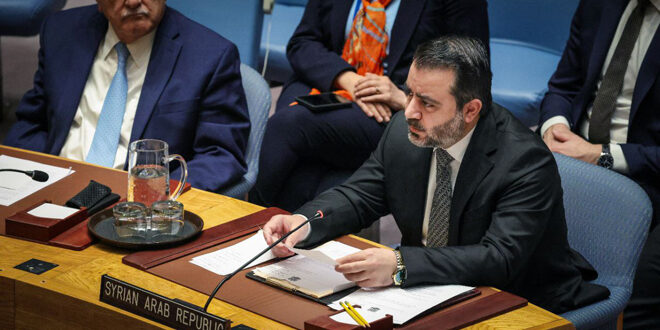New York, SANA- Minister of Foreign Affairs and Expatriates, Mr. Asaad al- Shaibani, has affirmed that the restrictions imposed on Syria in response to the violence of the deposed regime have today become a punishment for its victims, preventing them from obtaining the necessary materials, funding, and services for reconstruction. He called upon the United Nations Security Council and the entire international community to lift these sanctions and enable Syrians abroad to return voluntarily with dignity and safety.
During his address to a UN Security Council session on Tuesday, Minister al-Shaibani stated: “In Syria, we have formed a transitional government comprising the best national competencies and representatives from various segments of Syrian society. This government recently received unanimous endorsement from the UN Human Rights Council. Furthermore, despite formidable challenges, we have succeeded in unifying military factions under a shared constitutional framework and a genuine reform program.”
Minister al-Shaibani added: “In the first comprehensive national dialogue, nearly 1,000 Syrians convened at the Presidential Palace to discuss the most prominent issues affecting the country’s future. We are on the verge of launching a transitional justice body and an independent body concerned with the fate of the missing. This is in addition to our partnership with the Organization for the Prohibition of Chemical Weapons (OPCW) to identify and destroy the remnants of the former regime’s arsenal. We are also cooperating with the International, Impartial and Independent Mechanism (IIIM) and other justice-related bodies to document crimes and explore the best possible ways to achieve justice, accountability, and prevent the recurrence of violations.”
The Foreign Minister continued: “These steps, just six months ago, would have been considered utterly impossible. Yet today, they are a tangible reality. However, our national efforts are facing a genuine threat in the form of repeated Israeli aerial attacks that violate our airspace and sovereignty. The pretexts previously used to justify these strikes, namely the presence of foreign-backed armed groups, are no longer valid. These strikes constitute not only a blatant violation of Security Council resolutions, particularly Resolutions 242 and 497, but also destroy our civilian infrastructure and reopen the door to chaos and the resurgence of militias that Syrians have struggled for 14 years to confront.”
Minister al-Shaibani said: “The misleading narrative propagated by the Israeli side has completely fallen. Today, the Syrian people feel anxious and threatened by the Israeli side as a result of the continuous strikes, indiscriminate bombing, and unjust incursions. All of this is driving people to displacement and migration from villages and towns adjacent to the border strip in southern Syria. A number of martyrs and wounded have fallen as a result of this aggression. The expansionist approach, the exaggeration of risks, and the lack of respect for the security and sovereignty of neighboring countries will lead the entire region to further violence, conflict, and instability.”
Minister al-Shaibani added: “Israel’s practices towards Syria are what will encourage and provide a suitable environment for Iran-affiliated groups to destabilize Syria. Failure to take decisive decisions to deploy forces in the buffer zone will undermine those international efforts, weaken their potential, and further erode trust. We have met several times with UNDOF forces who feel despair, frustration, and helplessness as a result of the Israeli side’s obstruction of their mandate established by the Security Council.”
The Foreign Minister continued: “Christians, Kurds, Alawites, Druze, and Arabs are in complete agreement on rejecting foreign interference in our country. They reject Israeli practices and refuse to be used in Israeli media rhetoric that seeks to divide Syria and leave it fragile, filled with chaos and instability. Even Syrian Jews, whom we have met with repeatedly, reject these plans and policies.”
Minister al-Shaibani said: “If we can provide convincing and honest answers to these questions, we will be able to understand who is destabilizing Syria and who is building peace; who removed the Assad regime and its affiliated militias, and who violates the airspace, bombs sites, and invades our land; who recognizes Syrian diversity and includes it in the government, and who uses it in their speeches to promote sectarian division; who facilitates the tasks of UNDOF forces and who obstructs and prevents them; who facilitates the tasks of the OPCW to inspect potential chemical weapons sites, and who bombs them.”
Minister al-Shaibani added: “We remind this Council that the Golan remains under occupation 58 years after its illegal annexation, in blatant defiance of the principles of the United Nations. We reiterate our demand for the full implementation of Resolution 497 and call for enabling UNDOF forces to restore the lines prior to June 4, 1967.”
The Foreign Minister continued: “Today, we stand alongside our brotherly Palestinian people in Gaza, who continue to bear the brunt of a brutal war marked by relentless aerial strikes, a suffocating siege, deliberate starvation, the targeting of paramedics and journalists, the demolition of homes, and repeated violations of fragile truces. These violations not only cause a humanitarian catastrophe but also fuel a cycle of instability throughout the entire region. From this platform, we demand an immediate ceasefire, the protection of civilians, and the guaranteed, unimpeded entry of humanitarian aid.”
Minister al-Shaibani said: ‘Within our borders, we have worked diligently to dismantle Captagon networks that threatened communities in neighboring countries. We have begun to rebuild road networks, ports, and railways to facilitate trade and regional integration. Our clear objective is to transform war-stricken areas into economic corridors that benefit all countries in the region. The return of refugees is a central pillar of our recovery efforts; Syria, above all, is rebuilding with its own people. However, Syrians will not return to rubble or to an environment stifled by sanctions.”
Minister al-Shaibani added: “The restrictions imposed on Syria, originally in response to the violence of the ousted regime, today punish its victims, preventing them from obtaining the necessary materials, funding, and services for reconstruction. Therefore, we call upon this Council and the entire international community to lift these sanctions and enable Syrians abroad to return voluntarily with dignity and safety.”
The Foreign Minister continued: “Genuine security is not built behind walls, nor can it be protected within closed borders. Our security is inseparable from the security of our neighbors. No country can guarantee the safety of its people while threatening the sovereignty of others. This Council bears a historic responsibility and has a real opportunity to support Syria’s recovery and the stability of the entire region. We urge you to support mechanisms that achieve justice for all victims, and we implore you to establish a clear and coordinated common vision for reconstruction, to open avenues for trade, and to ensure the safe and dignified return of refugees.”
Minister al-Shaibani concluded his address by saying: “Let us replace the veto with insight, airstrikes with dialogue, and sanctions with solidarity and mutual support. Only then can every citizen in Damascus, Ramallah, Quneitra, and Gaza live in safety, dignity, and hope.'”
Manar /Ruaa al-Jazaeri
 Syrian Arab News Agency S A N A
Syrian Arab News Agency S A N A

